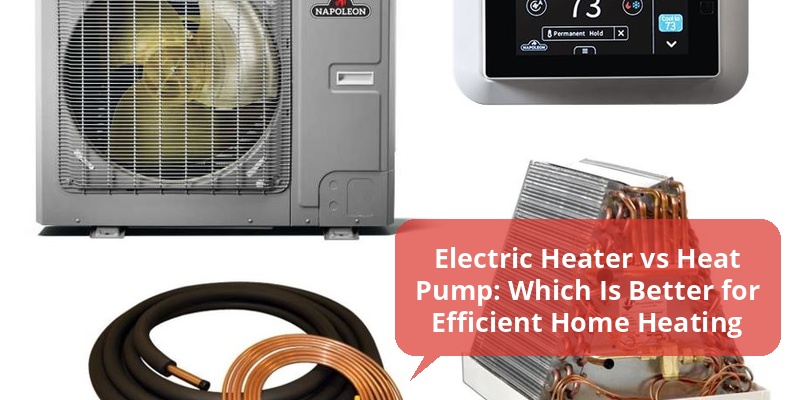Choosing the right home heating system is essential for comfort, energy efficiency, and cost savings. Electric heaters and heat pumps are two popular options, each with distinct advantages and disadvantages. This article explores the differences between electric heaters and heat pumps to help homeowners make an informed decision.
| Feature | Electric Heater | Heat Pump |
|---|---|---|
| Energy Efficiency | Lower efficiency, converts electricity directly to heat | High efficiency, transfers heat from outside air or ground |
| Operating Cost | Higher electricity bills | Lower electricity usage, reduced costs |
| Installation Cost | Low upfront cost | Higher initial investment |
| Lifespan | 10–15 years | 15–20 years |
| Heating & Cooling | Heating only | Provides both heating and cooling |
How Electric Heaters Work
Electric heaters generate heat by converting electrical energy directly into thermal energy through a resistive heating element. This simple mechanism produces warmth quickly and is suitable for localized heating needs or smaller spaces. Common types of electric heaters include baseboard heaters, space heaters, and radiant heaters.
Electric heaters are prized for their straightforward installation and instant heat output, making them popular for spot heating or supplementing existing heating systems.
How Heat Pumps Operate
Heat pumps work by transferring heat from one place to another rather than generating it directly. They extract heat from outside air, the ground, or water and move it inside during cold months. In warm months, heat pumps can reverse this process and function as air conditioners by removing indoor heat.
This dual functionality allows heat pumps to provide year-round climate control with high energy efficiency. Common types include air-source heat pumps and ground-source (geothermal) heat pumps.
Energy Efficiency Comparison
Electric heaters convert nearly 100% of electrical energy into heat but lack efficiency in cost terms since they consume electricity directly. Heat pumps, by transferring heat, use electricity more efficiently, often delivering three to four times more heat energy than the electrical energy they consume.
Heat pumps have a higher Seasonal Energy Efficiency Ratio (SEER) and Heating Seasonal Performance Factor (HSPF), reflecting their superior efficiency compared to electric resistance heaters.
Cost Considerations: Installation and Operating Costs
Electric heaters are generally cheaper to purchase and install due to their simple design and minimal equipment requirements. However, once operational, they incur higher electricity costs because they use more energy to produce the same heat.
Heat pumps involve a larger upfront investment, especially ground-source models requiring excavation. Despite higher installation costs, the reduced operational expenses often result in long-term savings.
Homeowners should consider both initial costs and ongoing energy bills to assess the total cost of ownership between electric heaters and heat pumps.
Environmental Impact and Sustainability
Electric heaters produce emissions indirectly depending on the local power grid’s energy mix. If the grid relies heavily on fossil fuels, the carbon footprint is higher. Heat pumps enhance sustainability by minimizing electricity use and integrating well with renewable energy sources.
By reducing energy consumption for heating, heat pumps contribute to lower greenhouse gas emissions and align better with environmental goals.
Installation and Maintenance Requirements
Electric heaters require minimal installation effort—often just plugging into an outlet or mounting on a wall. Maintenance needs are typically low or non-existent except for periodic cleaning.
Heat pumps demand professional installation to integrate outdoor and indoor units properly. Maintenance includes regular filter changes, cleaning coils, and system checks to ensure optimal performance.
While heat pumps demand more upkeep and expertise, their longevity and efficiency justify the additional care.
Best Use Cases for Electric Heaters and Heat Pumps
| Home Size/Type | Electric Heater | Heat Pump |
|---|---|---|
| Small rooms or supplemental heat | Ideal for quick, targeted heating | May be excessive and costly |
| Whole-house heating and cooling | Not practical or efficient | Highly effective and economical |
| Mild climates | Works but costly over time | Optimal efficiency and comfort |
| Cold climates | Reliable but expensive | Modern models perform well, may need supplemental heat |
Heat pumps are generally preferable for whole-home systems, particularly in moderate climates, while electric heaters serve well for supplemental or localized heat.
Key Performance Factors to Consider
- Climate Compatibility: Heat pumps are best for mild to moderate climates but advanced models can work in colder areas.
- Energy Costs: Local electricity rates impact the operating cost effectiveness of both systems.
- Installation Space: Heat pumps require space for outdoor units; electric heaters need minimal space.
- Heating Demand: Larger space or whole-house heating benefits from heat pump efficiency.
- Desired Features: Heat pumps provide cooling options; electric heaters do not.
Technological Advances in Heat Pumps and Electric Heaters
Newer heat pumps incorporate variable-speed compressors, improved refrigerants, and smart thermostats for enhanced efficiency and comfort. Ground-source models continue to improve with advances in drilling technology.
Electric heaters have seen innovations such as infrared technology and smart control features to boost safety and responsiveness.
Both systems are evolving to offer more options tailored to energy saving and user convenience.
Financial Incentives and Rebates
Many U.S. states and utility companies provide rebates, tax credits, or incentives for installing energy-efficient heat pumps. These financial benefits can substantially offset installation costs.
Electric heaters generally have fewer incentive programs due to their lower efficiency.
Consulting local programs can help homeowners maximize rebates in choosing heat pumps.
Summary: Choosing Between Electric Heaters And Heat Pumps
| Criteria | Electric Heater | Heat Pump |
|---|---|---|
| Efficiency | Moderate | High |
| Cost | Low installation, high running | High installation, low running |
| Climate Suitability | All climates | Best for mild/moderate, with cold climate options |
| Functionality | Heating only | Heating and cooling |
| Maintenance Needs | Minimal | Regular professional |
Deciding between electric heaters and heat pumps depends on individual needs, budget, and local climate conditions. Heat pumps often offer greater efficiency and versatility but require higher upfront investment.
